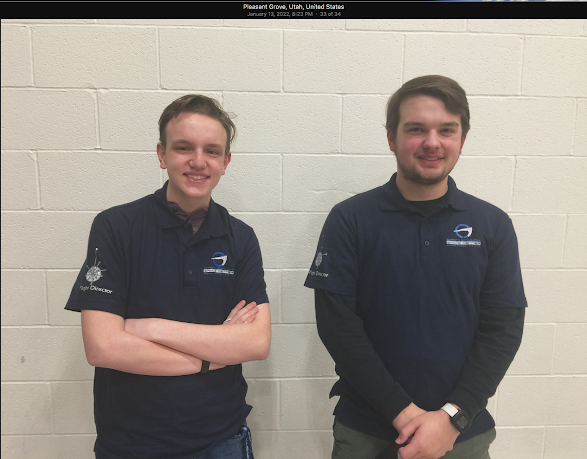My Classroom's Roman Emperor during our Rome Unit
Those of us in the Space EdVentures community know the importance of experiential education. It is our field of expertise. It is what we do with our spaceship simulators and simulations. I started using simulations during my student teaching at Central Elementary in 1983. We used poster board control panels for starship controls. I played the main computer and all characters sitting behind my desk with overhead projector. My use of simulations went beyond my fictional starship. I created historical simulations which ran through most of the school year. These simulations included
1. World War One living through the Russian experience.
2. The Russian Revolution of 1917.
3. The Weimar Republic of Germany
4. The rise of the Nazi party and World War II
5. Post World War two and the rise of communism.
Even today former students of mine will stop me in a store or send an email telling me how much they learned and enjoyed those simulations. Students like Kenny Packer, who sent the following message over Christmas.
 |
| Kenny Packer as the Russian Tsar with Prime Minister Ryan Tingey (1988) and Kenneth Packer and wife today in Russia |
Your classroom was inspiring. This was the beginning of my interest and love for Russia my career path in instruction, and my self awareness that power can corrupt. I’ll never forget the day you gave me a choice to keep the power after the simulated revolution or give it away to Ben Gurr who was playing the role of Lenin. Having tasted what it felt like to have everyone in the room stand up when you entered etc. I broke from the history you were trying to teach and said I wanted to keep the power for myself. Thank you for teaching us beyond just facts and figures. Your gift for teaching is something I will spend a lifetime trying to learn and replicate.
Today I teach 6th grade world history and math in addition to running the Young Astronauts Club at Renaissance Academy. I take my daily 50 minute history period and break it into three segments. The largest block of time is spent learning ancient history. We're currently studying ancient Rome. A smaller portion of time is spent discussing current world affairs. The last time segment is reserved for modern history. In modern history the class is moving its way crisis by crisis to summer 1914 and a historical flash point in Sarajevo, Bosnia Herzegovina.
As you can see in the two photos below, there are troubles brewing in the Balkans.
My class is playing Russia's part in the build up to World War I. We are currently working our way through the Russo/Japanese War. That war sets the stage for WWI. Newspapers go up nearly every day outside my classroom on the door and on the doorway. My students know to read the news as they arrive. This sets up the class discussions for that day. The photo above is from last year's class. They were on the verge of war.
My class is playing Russia's part in the build up to World War I. We are currently working our way through the Russo/Japanese War. That war sets the stage for WWI. Newspapers go up nearly every day outside my classroom on the door and on the doorway. My students know to read the news as they arrive. This sets up the class discussions for that day. The photo above is from last year's class. They were on the verge of war.
This year's news is seen above and below.
Tyler is one of my 6th grade students and plays the role of the Russian Czar. The job was his because he had the highest history grade average at the end of the second term. The ambassadorships and banking jobs are given out the same way - to those with the highest history GPA's at the end of the second term.
The current class government officials
The ambassadors fly their nation's flags on their desks during both history and math class.
They never know when a message may come in from their country. Diplomatic mail is placed on the whiteboard as it comes in.
The messages are written in that country's language. The ambassadors use Google translate to translate the messages into English for the Czar and class to hear.
Czar Tyler has many problems to solve. He is moving Russia's Baltic Fleet around the world to attack Japan. The fleet is old and badly in need of repair. Fueling his ship with coal is another problem. Most nations won't supply coal to the Russian fleet. He will be forced to negotiate with his cousin, the German Kaiser, for coal to be purchased as the fleet rounds Africa.
Czar Tyler's Declaration of War Against Japan
To keep the simulation as real as possible I operate a class economy. Students earn class money for their grades in math and history, their weekly progress reports, and from small side businesses they operate. One entrepreneurial student sells soda from his locker at lunchtime.
Czar Tyler earns money to operate the government, pay his officials, and run a war by taxing the classes. All 83 sixth graders pay their share to keep the system working. They soon learn fighting a war can be expensive. Often they have little cash left to spend on Friday treats (pastries, cookies, cupcakes, rolls, and croissants I supply every week) after taxes. Soon they grow restless and dare I say "revolutionary" - which leads to more headaches for the Czar. The ambassadors are exempt from taxes but must pay rent and utilities for their embassies.
The Czar, Prime Minister, and Bankers sit at a set of desks in the back corner of the room under the Russian Imperial flag. The bankers are responsible for the imperial finances. Financing a war can be stressful. Currently most of the Pacific fleet is non operational because of a superior Japanese naval force.
Currently the class is desperately trying to raise funds to rebuild the nation's navy. The Imperial Bank prints class money. I use photocopied money collected during my world travels.
Currently the class is desperately trying to raise funds to rebuild the nation's navy. The Imperial Bank prints class money. I use photocopied money collected during my world travels.
My job is to keep the simulation as true to history as possible. Instead of reading history, my students live it, and by doing so they gain an understanding as to WHY things happen and not just WHAT happened.
I started doing the historical simulations at Central Elementary School in Pleasant Grove in 1983. They ran every year until I opened the Christa McAuliffe Space Education Center in 1990.
 |
| The British Prime Minister's office. Room 20. Central Elementary School 1985 |
 |
| The disappearing German population. The class was playing Germany's role in the start of World War II. |
 |
| Jesse was the German Chancellor during the German Weimar Republic. He couldn't stop hyperinflation from destroying the savings of most of the students in the class. 1985 |
A darkness will soon descend on the classroom as time carries us to 1914. Hard lessons will be learned and fortunes lost. Such is the way of things. Such is the glory of experiential education.
Mr. Williamson
Imaginarium Theater
The Best Videos From Around the World Edited for a Gentler Audience












































